Hospo Circle: Panel Discussion on the State of the Industry, Current Trends & the Future of Hospitality

Lightspeed and OpenTable recently hosted Hospo Circle, an event that brought together local hospitality professionals to share insights, explore hot topics, and provide an opportunity to connect with peers in the industry.
Hosted at Askal in Melbourne CBD, the evening kicked off with a panel discussion that shared insights into the current state of the industry and what the future looks like for hospitality venues.
On the panel, moderated by Drew Bowering from OpenTable, we were joined by:
- Charlie Carrington, Owner and Head Chef at Atlas Dining
- Kirbie Tate, owner of JAMES restaurant
- Samara Schinc, owner of Pinchy’s and Pearl Chablis
- Andrew Fraser, Managing Director for APAC at Lightspeed.
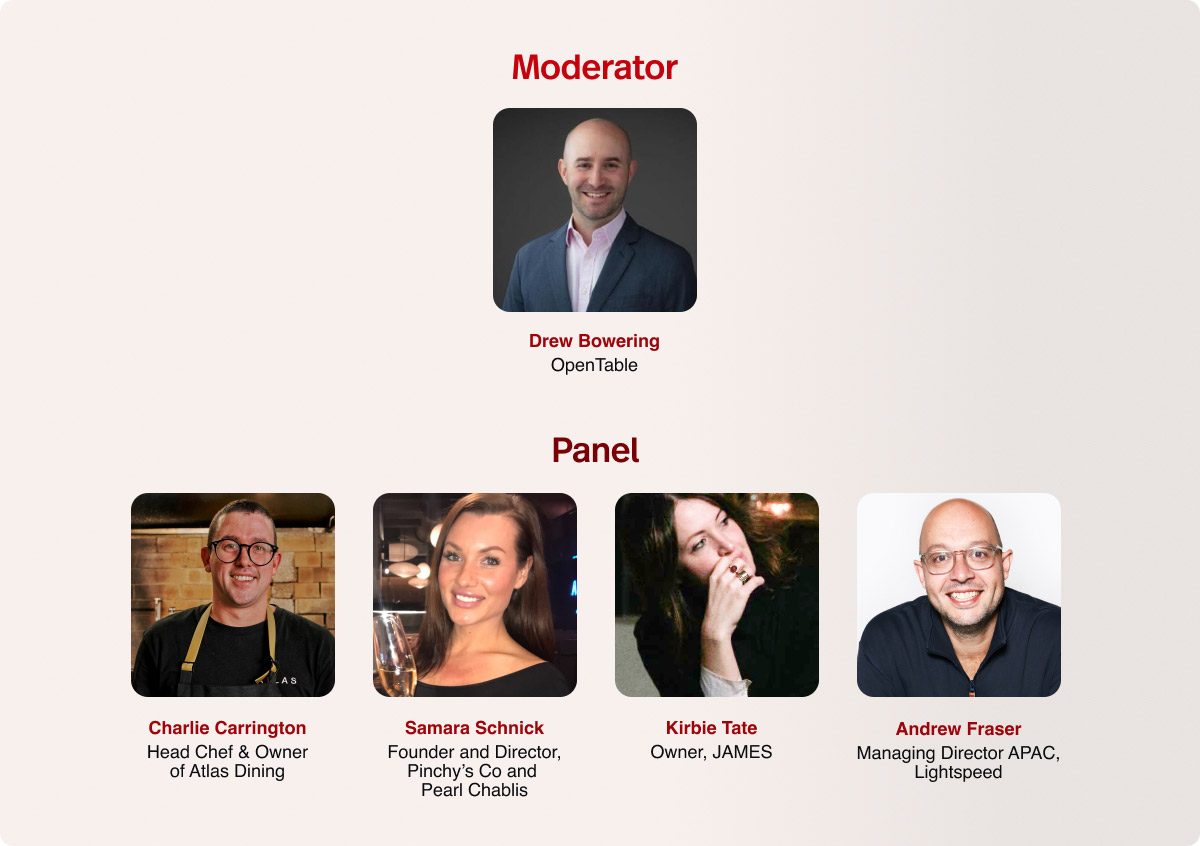
The current state of the industry
The panel kicked off by exploring the current state of the industry, with Drew painting a turbulent picture of the last few years.
What a roller coaster.”
“The pandemic hit… Then there’s the shortage of qualified staff that came off the back of [Covid], border closures impacting tourists and the spending they bring,” comments Drew.
“Then we had revenge dining. And then a period of normalising. But now we’ve got the economic impacts that we’re seeing, interest rates, lower consumer spending, etc..”
To reiterate these challenges, Drew referenced Lightspeed’s 2024 Hospitality Report, which revealed that 99% of hospitality operators have been impacted by inflation.
With hospitality businesses battling inflation and the cost of living crisis on two fronts–reduced customer spending combined with the increased cost of operating–the panel moved on to discuss what other challenges venues are facing and their predictions for the future.
Hospitality experts: key takeaways
From challenges in the industry to sustainability, artificial intelligence and the role of technology, the expert panel touched on several hot topics throughout their discussion. Here are some of the key takeaways:
- Staff shortages have led to a skills gap and inflated wages
- Unpredictable customer behaviour impacts labour costs
- Creative, agile business models are essential for success
- Lack of appreciation for venues’ rising costs
- Importance of pivoting
- The role of technology
- Artificial intelligence: positive or negative?
- Predictions for the future of the industry
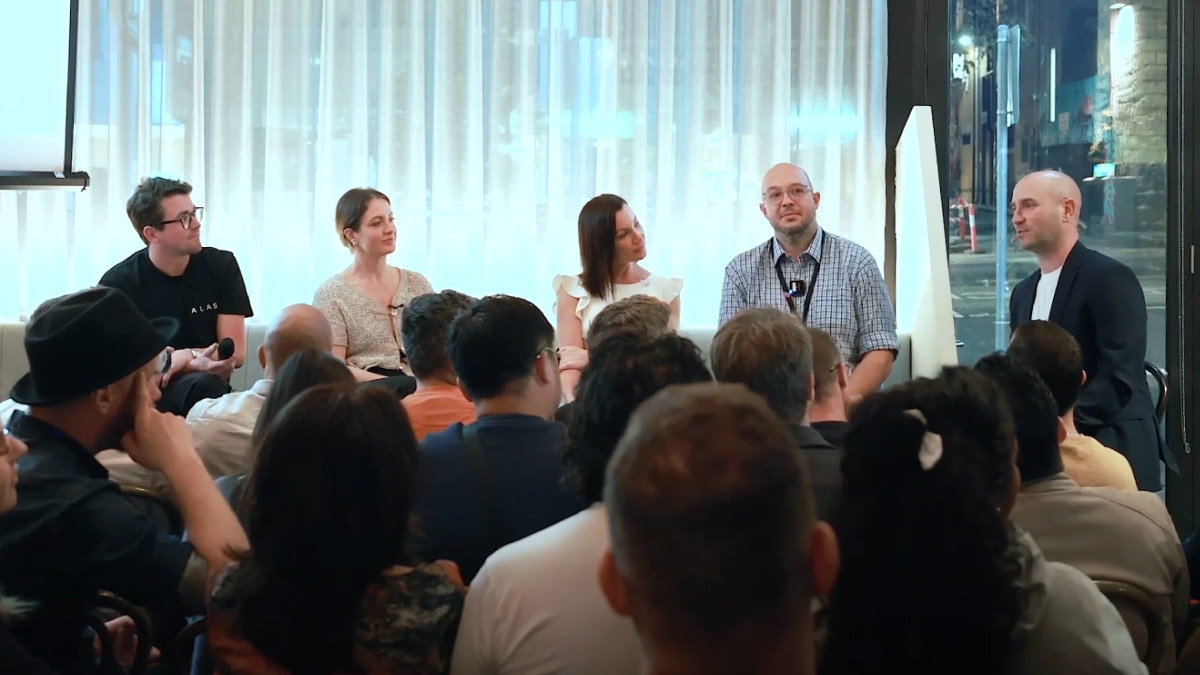
Staff shortages have led to a skills gap and inflated wages
For Samara, owner of Pinchy’s and Pearl Chablis, the biggest challenge facing her business is the lack of qualified hospitality staff who are in it for the long haul.
“Before Covid, there was a lot of professional staff in hospitality, people that wanted to make that their career… then Covid hit, and most of those people went and found work elsewhere.”
Staff shortages, particularly a lack of skilled workers, have led to a dramatic increase in wages for Samara’s venues, as in-demand staff have the power to dictate their salaries.
“For us, wage cost is the biggest thing that has changed in such a short period.”
“Even now, we’re still having the knock-on effect of not having professional people in the industry. So those staff can dictate their own pay rates.”
“Obviously, inflation and the cost of all of our goods are all going up as well. But for us, the hardest thing is finding good people that will stay with your business.”
“The cost of hiring, the cost of training, the cost of rehiring, the cost of retraining, that’s the one that’s really taken the biggest hit.”
I think it’s quite a transient job now for a lot of people.”
Unpredictable customer behaviour impacts labour costs
For Kirbie, owner of JAMES restaurant, one of the most significant changes she’s noticed is in people’s dining habits; customers have become more unpredictable, which brings operational challenges.
“What we could rely on before we can no longer rely on,” she comments. “It’s more about predictability. Habits have changed.”
We can’t rely on somebody winding up at a cafe or a restaurant for their lunch break five times a week.”
This unpredictability makes it difficult to schedule staff, which then impacts costs.
“What we’re finding hard is that we can’t predict what’s coming in in order to manage that cost,” explains Kirbie.
“That feeds back into a labour issue. We find it really hard to manage our labour because it’s unpredictable week to week.”
“My biggest challenge, certainly for day service and lunch trade, is that you really don’t know what’s coming. So you’re spending all of this money on labour, which is high, and you’re not able to manage it.”
Creative, agile business models are essential for success
Hospitality, as an industry, is constantly evolving. While Covid was one of the most challenging times for businesses, it forced venues to be creative and think outside the box.
“During Covid, we launched a meal kit company,” comments Charlie, Owner and Head Chef at Atlas Dining. “It’s very similar to a HelloFresh style model, selling raw ingredients and a recipe card.”
“Being a little bit creative outside of what we can do and expanding on our brand [is important].”
After launching Atlas Weekly to keep the business ticking over during Covid, the initiative was a huge success and is now a mainstay of their operating model.
“We’re a very brand-led restaurant. And fortunately for me, that’s meant that we can bring our customers on a journey and sell to them more often.”
At our restaurants, someone might want to come once a season when we change a cuisine, but with these boxes, we can get them on a subscription every week.”
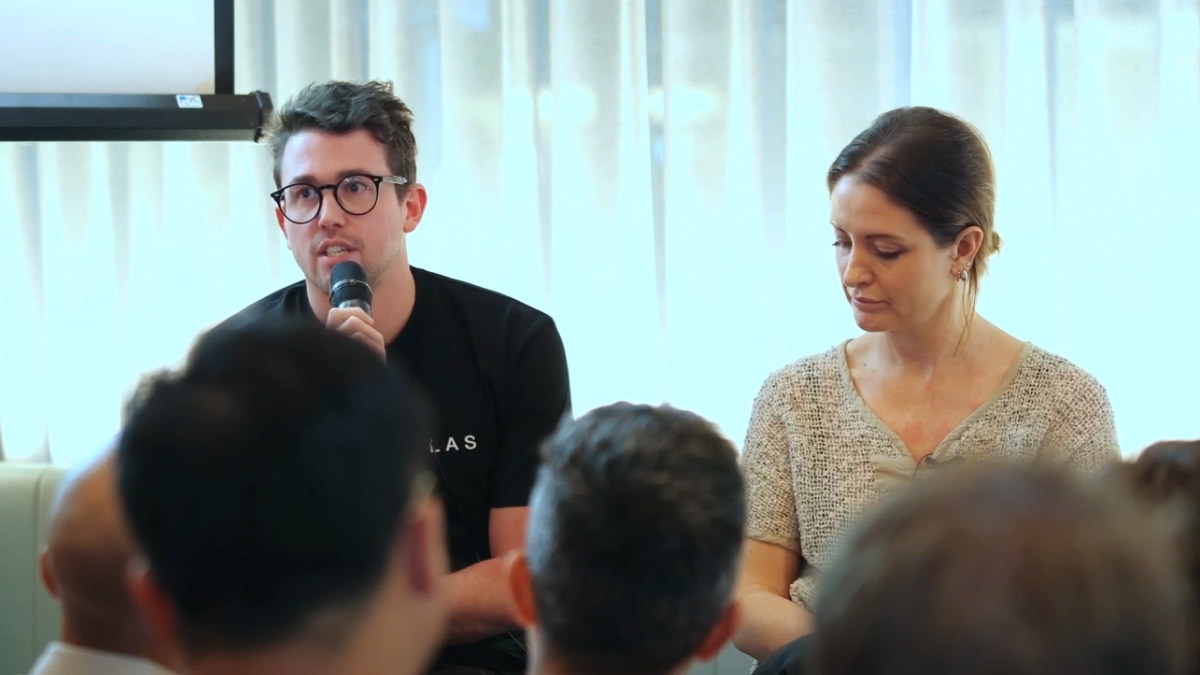
Lack of appreciation for venues’ rising costs
Another key topic during the panel discussion was consumer appreciation, or lack thereof, for the challenges associated with rising food prices and operational costs.
The consensus was that customers have little appreciation for how much it costs a restaurant to get the dish onto a plate.
“Even with what’s out in the media and they’re reading these challenges, I think people are still concerned with what it’s costing them and their experience,” comments Kirbie.
“I don’t really think that they connect with the challenges of the industry. And I don’t think it’s naive to think they will.”
However, Kirbie isn’t necessarily blaming customers for their apathy.
“We’re a business, and we need to solve those problems. It’s not about people understanding the costs. It’s about us being clever with the costs.”
$36 for broccolini
“A good example is today I went out and had lunch, and we were charged $36 for broccolini,” explains Kirbie.
“My guest, who’s not in hospo, was like, oh my God, that’s outrageous. And I was like, well, that’s actually what this broccolini should cost, you know?”
“The fact that it was just listed as broccolini for $36 was the issue. They could have been clever about what that dish was.”
“I think it’s for us to create the solution rather than to expect the customer to just accept it.”
“I don’t think people will ever sit and say, well, it’s okay for me to pay $36 for broccolini. I mean, that’s always going to be ouch. It’s up to us to be clever about what we’re doing and to adapt.”
Importance of pivoting
With so many challenges facing hospitality businesses, the panel went on to discuss the importance of acknowledging when something isn’t working and pivoting your operating model if needed.
“We actually just went through a huge shift for Pinchys’,” explains Samara. “When we first opened, and up until right now, we were doing quite an untraditional form of dining.”
“Instead of your dinner just being your entree and your main, we wanted you to try 6 or 7 different things. So Pinchys’ was born out of that sort of tapas-style dining. And we did really well with that.”
However, Samara acknowledges that Pinchy’s is quite a summery brand, with lots of seafood and light dishes. So, coming into the winter months, they’ve adjusted their menu to incorporate a more traditional dining style and broaden their appeal.
We’ve pretty much changed our whole menu.”
“We just noticed such a huge drop in winter that we’ve had to really pivot. So we’ve almost done a 180 and gone against what we set out to do.”
“We’re still doing a lot of beautiful dishes, but we’ve had to give in a little bit to what people expect, which is entree and dessert,” explains Samara.
“We’ve pretty much changed our whole menu just in the last week to go into winter feeling a little bit more confident that we’re giving people what we think they’re going to want this time.”
Midweek menus
Charlie echoes this sentiment with a similar story.
“We recently launched a midweek barbecue menu. So we’re doing a very similar style, but it’s a shorter menu because we usually offer five courses, and this is served over three.”
“We actually launched last week and we’ve seen a lot of demand from that.”
While Charlie acknowledges that their original concept is a huge success, pivoting their mid-week menu is a great way to appeal to new customers.
Our concept definitely does bring people back. We have literally die-hard people who’ve been to every single menu.”
“And there’s definitely a lot of FOMO; they can’t miss one because then they’ve broken the chain.”
“But I think [the new menu is] really a win for the customers. And I think it’s a great entry point for people who haven’t experienced what we do before.”
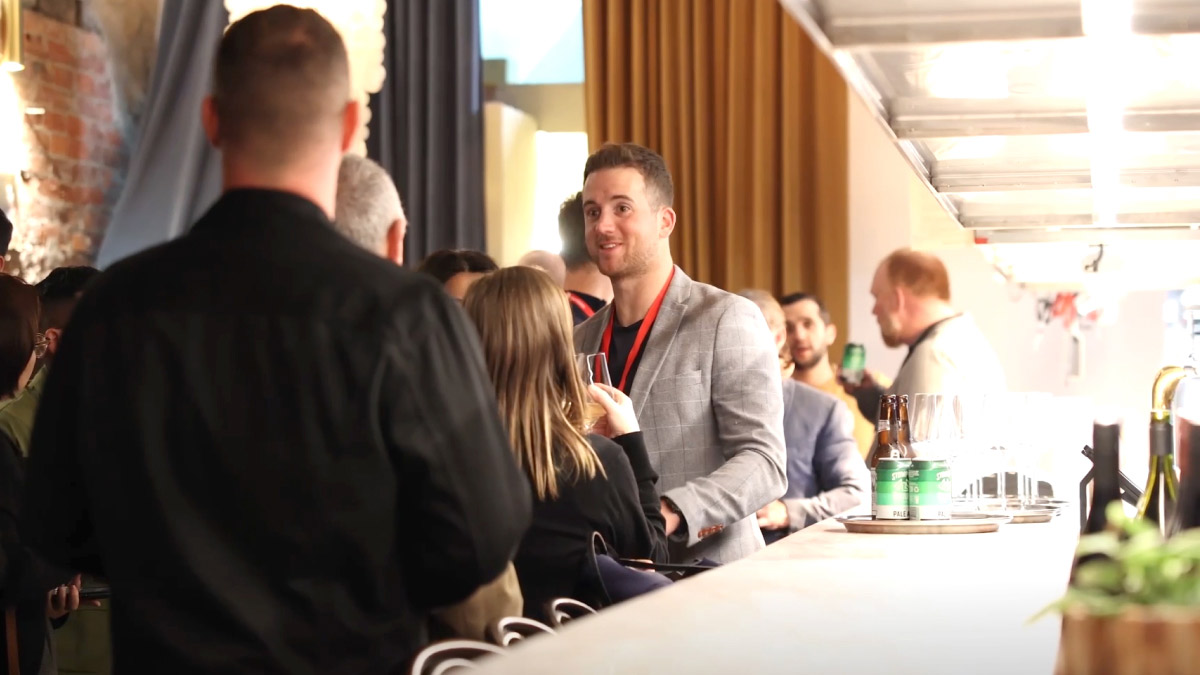
The role of technology
Next, the panel discussed technology and its role in hospitality.
Boost efficiency
“I think technology is massive for hospitality,” comments Charlie. “But if you look at almost any other industry, there’s so much more advancement. So I think it’s actually very early days as far as technology goes… which is a good opportunity. ”
“There are the obvious ones, you know, booking systems, accounting software, potentially e-commerce stores, those sort of things… Or you’re like a McDonald’s, and you can afford to have robots and stuff.”
“Hospitality is such a connections-based business… people want service, they want experience. A lot of it’s about storytelling, so I think that will always be that way.”
“But I think behind the scenes, the technology, whether it’s in the kitchen, whether it’s in ordering processes, whether it’s in stocktake management, all these things will just get better and better over time.”
“Restaurants will become way more efficient. And I think that is the ultimate key at the moment because it’s way too labor-heavy compared to other industries.”
Data and Insights
For Kirbie, data and business insights are instrumental in running and growing a business, and this is where she sees technology playing a pivotal role in the coming years.
“We’re only really starting to utilise [tech] platforms in terms of getting real-time information to us.”
“The big one for me would be being able to get sales over labour data in actual real-time notifications. Where you’re at, what you’re spending… it would be life-changing.”
“Real-time data is key to us being able to run these businesses as well. I feel like it’s coming, and we’re talking about all these things we can access, but it still feels clunky and a little far away.”
Saving time
Andrew, Managing Director for APAC at Lightspeed, echoes Kirbie’s sentiment and acknowledges the huge potential tech has for providing insights in the future.
“It’s such an opportunity to be able to provide really great insights, real-time about cost, about people, about dining preferences and those types of things. And I think that’s really starting to come together now.”
However, one of the most significant benefits Andrew believes tech can afford hospitality venues is saving time that can be reinvested elsewhere in the business.
“Where I tie it all back to, though, is what you were saying earlier and is around time, whether it’s labour time, whether that’s the ability to spend more time with your diners and those types of things.”
“By having a point of sale as opposed to pen and paper… that’s an element that can save time, effort, energy, and where you can invest things back. Another one is the payment side of things. Having the payments and POS linked also helps with the time, effort and energy.”
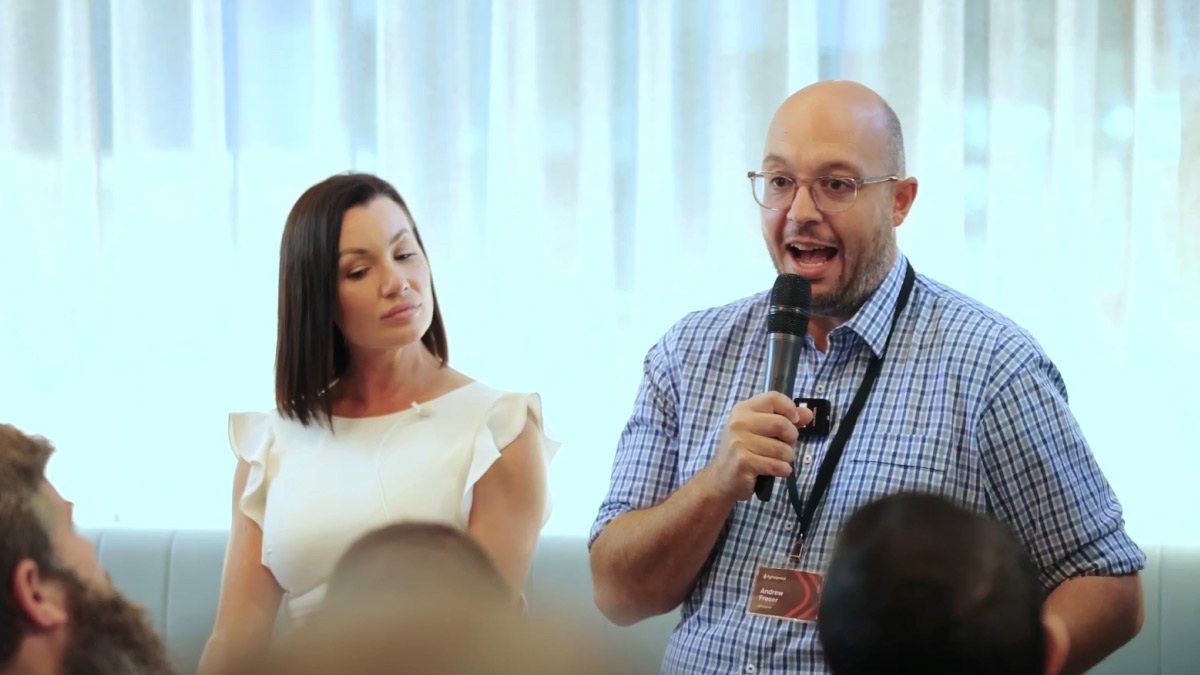
Artificial intelligence: positive or negative?
Naturally, when discussing technology, the panel segued to artificial intelligence and its potential role in the industry.
Andrew explained how Lightspeed is leveraging AI within the platform to help restauranteurs optimise their menus, making them more attractive to customers and lucrative for the business.
“It matches payment data, what customers have had before and then what they come back for,” explains Andrew.
“When they come back, what do they order? Do they order the same things? Do they order different things?”
Essentially, what are the things that really get people coming back? What are the things where somebody tries and then never comes to the restaurant again?”
By matching payment data with menu data, Lightspeed crunches the numbers and provides recommendations specific to each business on optimising their menus.
Stock control and wastage
AI’s capabilities are in their relevant infancy, and Charlie looks to the future and what he’d like to see from AI in restaurants.
“I reckon the big one would be stock on hand and stocktake management.”
“Within the next 5 to 10 years, restaurants may even have cameras where things are purchased, brought in, checked off as they’re sold, then you can real-time look at what you’ve got left, what you’ve got to move,” comments Charlie.
“When you’re selling perishable products, it’s so important to not have wastage. So, if you’re able to see what you’ve got on hand and how you can move it, that would be a real dream I could imagine for most restaurants.”
Charlie also sees the value in AI taking up mundane, time-consuming tasks so staff can focus more on growing the business and providing an exceptional customer experience.
“Very mundane tasks if they can become managed for you and you can then focus on the bigger picture, things that you’d love to have the time to do, then it’s a benefit for everyone.”
Predictions for the future of the industry
Sustainability
“I think the number one trend that people will be talking about in ten years is probably more sustainability than anything else,” comments Samara. “People are just going to be a little bit more mindful about the decisions that they make and how potentially it could affect the environment.”
“Vegan or plant-based options will continue to be more and more popular. We’ve seen just in the last ten years, even people that aren’t vegan are starting to know the implications of the choices that they make when it comes to whatever they want to eat.”
As a result, Samara believes restaurateurs will have to keep up with this trend and start offering more plant-based products if they want to remain relevant to customers.
When it comes to tech advancements in the industry, Samara acknowledges that things are changing rapidly. However, she firmly believes that tech and AI shouldn’t detract from the essence of the hospitality experience.
“There’s a fine line between tech advancements taking away interpersonal connections,” comments Samara.
“I think one of the most exciting things about going to a restaurant is dealing with the waitstaff or speaking to the Sommelier about the perfect wine, and there’s no AI that’s ever going to be able to take away from that.”
Maintaining connections
Kirbie continues in the same vein, reiterating the importance of maintaining connections rather than letting technology take over all aspects of the industry.
“I think we will be talking about how we can utilise all of this tech and AI and still connect and still remain connected with our people,” comments Kirbie.
Hospitality is about people. It’s humanised. It’s face to face.”
“I think we’ll be talking about whether it’s beneficial or not or whether it was beneficial to start to take away from that connection.”
“[For example] table ordering, tapping on your phone so you don’t have to come up and talk to somebody about how your experience was before you leave the table, all that sort of stuff. I think we’ll be talking about whether that was beneficial or not or whether that took something from the industry that we all love.”
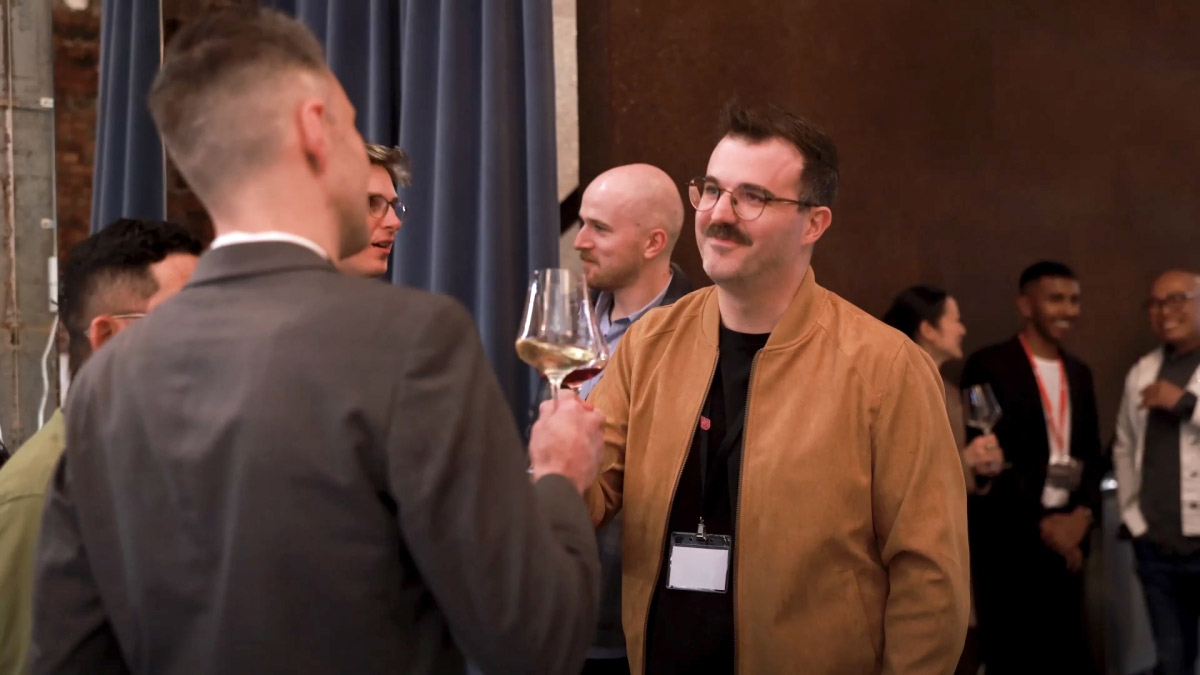
Australian cuisine on the world stage
For Charlie, he hopes to one day see Australian cuisine and Australian chefs lauded on the world stage.
“Australia, it’s one of the most diverse places on Earth,” comments Charlie. “We don’t really have an Australian cuisine per se, but then you’ve got so many amazing people from all around the world that will bring things from their home country, cooking local ingredients and then letting that really develop.”
“That one thing I’ve always thought about is I’d love to see Australian cuisine in my lifetime… we’ve got so many amazing chefs that are already doing creative things, but how can we show that on a world stage? Besides Outback Steakhouse, we want to see some Aussie restaurants.”
TL;DR?
You can watch the recording instead!

News you care about. Tips you can use.
Everything your business needs to grow, delivered straight to your inbox.


